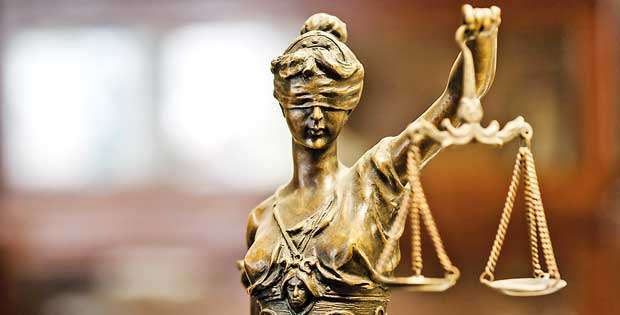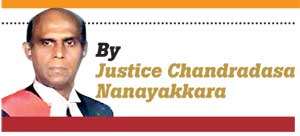02 Jul 2018 - {{hitsCtrl.values.hits}}

There has been a growing concern about the deterioration of the professional standards of the legal community in many countries. This trend is particularly seen in many Third World countries including Sri Lanka. The deterioration in professional standards is often reflected in the quality of legal output and the professional services rendered by the legal community. Decline in competency, efficiency and the standards of the legal profession are bound to bring about corresponding decline in the standards on the Bench, because it is the Bar, which nurtures and fosters those who aspire to a career in the judiciary.
 We live at a time when core values of the profession are being threatened. As a result the whole climate of opinion has become hostile to the legal profession. According to the latest survey conducted by the American Pew Research Centre public esteem for the legal profession has declined sharply over the last few years. The legal profession has been ranked the lowest among the professions, ‘For the Americans the legal profession is one the most despised and hated professions. It commands little respect in their estimation’.
We live at a time when core values of the profession are being threatened. As a result the whole climate of opinion has become hostile to the legal profession. According to the latest survey conducted by the American Pew Research Centre public esteem for the legal profession has declined sharply over the last few years. The legal profession has been ranked the lowest among the professions, ‘For the Americans the legal profession is one the most despised and hated professions. It commands little respect in their estimation’.
Although much has been spoken and written on the deteriorating standards, nothing substantial seems to have been done to arrest this trend by the authorities charged with the responsibility of regulating the profession in this country. There have been no genuine efforts to address the problems affecting litigants in many ways by the professional misconduct and malpractices indulged in by the few individuals in the profession.
There are a multitude of questions connected with the legal profession. One thing is manifestly clear; unless and until serious problems confronting the profession are addressed in a realistic manner we must expect further deterioration of the professional standards and the eventual collapse of law and order in the county. One can see an attitude of complacency and resignation in the face of this declining trend. It is regrettable that there is a surprising and disturbing sense of apathy and inertia on the part of the part of the authorities.
If you walk into some of the courts in the island particularly the Magistrate’s Court you can see for yourself how touts and other intermediaries hang around the environs of Courts to persuade prospective litigants to retain particular Attorneys-at-Law regardless of their abilities and capabilities. In some courts Attorneys-at-Law themselves stand outside the court houses with business cards in hand, offering their services to litigants; a disgusting practice which degrades the whole profession. They lack boundaries when stooping to such low conduct. People are appalled by the shame and disgrace some lawyers bring to the profession and the legal profession has suffered tremendous damage to its image by the conduct of a few unscrupulous lawyers.
Then, there are some lawyers who depend entirely on the police for their practice. They resort to what is known as police touting for their survival. They have a secret arrangement with the police whereby the police direct the litigants to their favourite lawyers and thereafter they split the fees. For each case the police officer gets his share of the fees. There are also instances where defence lawyers have made attempts to win over the witnesses with the cooperation of prosecuting officers with the intention of securing acquittals in cases. Touting has long been an offence under the Intermeddlers with Suitors Act of 1894. But prosecutions under this act have been few and far between. Therefore, it is time that all forms of touting and soliciting are eradicated from the legal practice. It is also the responsibility of the police department and the police commission to take necessary remedial measures in regard to misconduct and malpractices resorted to by the police in the course of the administration of justice.
It is essential that lawyers should be dignified in their speech. Some lawyers address police officers as “Machan” and the police officers in turn address the lawyers by their first names. Some lady lawyers too address police officers by their first nameswhile the police officers too address them by their first names. People are profoundly concerned with this lack of civility and professionalism demonstrated by the lawyers and other agents involved in the administration of the justice system.
Members of the legal profession occupy a position of privilege because of the high nature of its calling. Not only in Srilanka but all over the world there is a high proportion of heads of State, ministers and high officials drawn from the ranks of the legal profession. For centuries lawyers have stood at the centre of society. There were eminent and patriotic lawyers in the past who fought valiantly for the independence of this country. The Legal profession has a rich and glorious past and members of the legal fraternity can justifiably be proud of its past.
The legal career has been a hallmark of prestige. For centuries, the practice of the law has been considered a profession. The word profession suggests a certain stature and prestige. The legal profession claims to be an honourable and noble profession. But it should be remembered that the honour and nobility come to a profession by the conduct and the behaviour of its members.There have been instances when the bar enmasse refused to appear for certain litigants; a practice repugnant to the ethical principles of the profession. But it should be remembered that professional ethics demand that a lawyer who practises his profession is duty bound to appear for any litigant who seeks his services regardless of the nature of the case or any opinion, which the lawyer might have formed as to the character, reputation, cause, conduct of that person. In some instances lawyers confine their practice to a particular field of law and the lawyers who are engaged in notarial work invariably delegate their notarial tasks to clerks, secretaries and other lay persons. Such delegations would be proper as long as the lawyer maintains direct relationship with his clients and supervises the delegated work and takes complete responsibility for the work done. But there have been instances where lawyers have notarized deeds and other conveyancing documents drafted by their clerks and signed in the absence of the attorney in contravention of the Notary’s Ordinance. It is illegal for a notary to notarize any previously signed conveyancing documents, and in these cases the attorney attesting the conveyancing documents had never been present to testify to the identification of parties. This is a practice in conflict with the most fundamental requirements of the office of lawyer doing notarial work. A client visits a lawyer who is engaged in notarial work, when there is an issue that needs addressing in the hope that the lawyer would attend to his needs with fidelity. But his failure to perform his duties as a notary would result not only in immense damage to those directly affected by the impugned document but also undermine the integrity of the notary. Therefore, it is the duty of every lawyer who acts as a notary to discharge his functions faithfully to the satisfaction of his client.
Although defalcation and embezzlement of money by lawyers acting in a fiduciary capacity is not a frequent phenomenon we cannot say it is rare. Because there have been instances in which some lawyers were embroiled in financial scandals and other fraudulent transactions. Public look to the profession to keep its house in order. When a lawyer defalcates funds belonging to clients the whole profession is blackened in the public eye.
Generally every learned profession demands proper decent attire. Therefore, it is imperative for legal practitioners to dress appropriately in a manner that enhances respect for the legal profession and dignity of the court. It should be realised that the image of an attorney matters a lot and they should not look sloppy in appearance as a sloppy appearance would be likely to affect the perception of the litigants. What the lawyers wear in courts can have major impact on the perception of litigants and the members of the public. A bad dress will make a bad impression on the clients and the people. There have been instances when courts have come down hard on Attorneys who have failed to dress appropriately.It is true that merits of an argument in a case and a good knowledge of the law are crucial to wining a case but the value of the image of an Attorney should not be underestimated.
The bar must maintain the highest standards of integrity, as an honourable bar is a strong support to an honourable bench. Uprightness and integrity is something every client expects from every legal practitioner. Even the conduct unrelated to one’s practice which may be demonstrably attributed to lack of integrity tends to lower the esteem in which the whole profession is held.
Over the past few decades, members admitted to the legal profession have increased by leaps and bounds. Along with that increase the profession has become highly competitive and commercialised. ‘In an era of intense competition and commercialization legal practitioners in their race for survival will tend to place the monetary aspect of the profession higher than the core values and aspirations of the profession. It would be of paramount importance to all of us who are interested in the profession to work determinedly keep aloft the high ideals for which the profession has stood for centuries. We must resolutely conduct ourselves to measure up to the standards set and maintained by our predecessors. May the glorious past serve as an example for the members of the profession to tread the correct path. May the members have the wisdom and strength to do so.
28 Oct 2024 2 hours ago
28 Oct 2024 2 hours ago
28 Oct 2024 3 hours ago
28 Oct 2024 4 hours ago
28 Oct 2024 7 hours ago